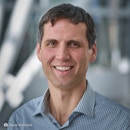Black Holes and Quantum Gravity
- Speaker
-
 Thomas Hartman, Ph.D.Associate Professor, Physics, Cornell University
Thomas Hartman, Ph.D.Associate Professor, Physics, Cornell University
Presidential Lectures are a series of free public colloquia spotlighting groundbreaking research across four themes: neuroscience and autism science, physics, biology, and mathematics and computer science. These curated, high-level scientific talks feature leading scientists and mathematicians and are designed to foster discussion and drive discovery within the New York City research community. We invite those interested in these topics to join us for this weekly lecture series.
Black holes have mysterious properties that indicate that they are composed of an enormous number of microscopic parts. This has led to the idea that in quantum gravity, spacetime itself emerges from something more fundamental.
In this lecture, Thomas Hartman will describe how black holes provide a window into quantum gravity and how scientists use the ‘bootstrap’ technique to study them. This line of research leads from black hole thermodynamics to the notorious sphere packing problem in mathematics, first studied by Johannes Kepler and contemporaries four centuries ago.
To attend this in-person event, you will need to register in advance and provide:
Acceptable proof of vaccination (vaccine card/certificate, a copy or photo of vaccine card/certificate or electronic NYS Excelsior Pass or NJ Docket Pass)
Photo ID
Eventbrite ticket confirmation email with QR code
Simons Foundation Health Screening Questionnaire approval email
Entrance will not be granted without this documentation.
On-site registration will not be permitted. Walk-in entry will be denied.
